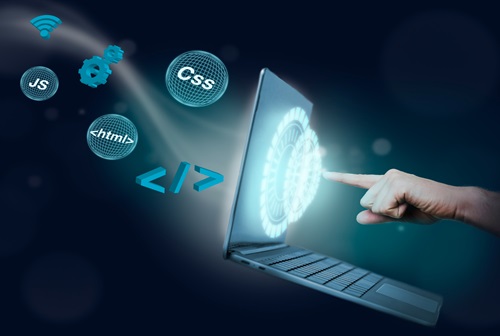What is the Definition of an Algorithm?
Definition of an algorithm is essentially a set of rules or steps used to solve a problem or accomplish a task. It’s similar to following a recipe to bake a cake. You begin with the ingredients (data), follow the steps in order (instructions), and ultimately, you get your cake (result). This is essentially how algorithms function. They act as instructions for computers and machines, aiding them in efficiently processing information and completing tasks
Algorithms in Everyday Life
We encounter algorithms frequently, not just on computers but in real life too. For instance, when you follow a set of steps to reach a destination, that’s purely a definition of an algorithm. When you organize books by genre or alphabetize a list of names, you’re using a sorting algorithm. In reality, algorithms aren’t just for programmers or tech geeks, they’re a part of everyday problem-solving.
How Do Algorithms Work?
Algorithms work by following a series of steps or instructions to process data and come up with an output. The cool thing about algorithms is that they can be incredibly simple, like a basic set of instructions, or extremely complex, involving advanced math and lots of data.
For instance, a search algorithm assists a search engine, like Google, in scanning billions of pages to display the most relevant results to you. It follows a series of steps to examine the data, analyze it, and then provide you with the answer, all in just a fraction of a second! Pretty cool, isn’t it?
Why Are Algorithms So Important?
“Algorithms play a crucial role in modern technology. If we talk about the definition of an algorithm, they are responsible for the functioning of our phones, the operation of apps, and even for the personalized show recommendations on platforms like Netflix.”
They help us automate processes, making everything faster and more efficient. Rather than humans spending hours searching through data, an algorithm can do it in seconds. Plus, they reduce errors because they follow a consistent set of rules.

Types of Algorithms You Should Know
There are so many different types of algorithms, but let’s stick to the basics.
- Search Algorithms:
Have you ever used Google or any other search engine? The algorithms involved scan billions of web pages in just milliseconds to provide you with the best results for your query. Google’s search algorithm utilizes various techniques to rank these pages based on relevance, quality, and user intent.
- Sorting Algorithms:
These algorithms help arrange data in a certain order. For example, arranging numbers from smallest to largest or sorting a list of names alphabetically. Sorting algorithms are widely used in databases and other systems to organize and retrieve information quickly and this is the one way to describe the definition of an algorithms.
- Pathfinding Algorithms:
When you use GPS or Google Maps to find the shortest route to your destination, you’re benefiting from pathfinding algorithms. These algorithms analyze all possible routes and choose the one that gets you there the fastest and that’s another way of describing the definition of an algorithm.
- Machine Learning Algorithms:
These are more advanced algorithms that learn from data. They’re used in AI applications to make predictions, like recommending movies on Netflix based on what you’ve watched before or identifying patterns in financial markets.
Algorithms in Real Life:
Okay, let’s step away from the tech world for a minute. Algorithms aren’t just for computers. We use them in our daily lives without even realizing it.
- Cooking a Recipe:
Making a cake, that’s an algorithm! You have ingredients (data), and you follow a set of steps (instructions) to get your delicious cake (output).
- Planning Your Day:
If you create a to-do list or schedule, you’re following a plan that’s basically an algorithm. You’re organizing tasks in a specific order to get them done efficiently.
- Following a Workout Routine:
Your workout routine is also an algorithm. It’s a step-by-step plan designed to achieve a specific fitness goal, like building muscle or losing weight.
How Algorithms Impact Technology
Now, let’s shift back to technology. The emergence of algorithms has significantly altered the functioning of the world. Let’s delve into some key areas where algorithms wield substantial influence and perfect definition of an algorithm.
- Social Media:
Ever wonder how Instagram or TikTok knows what videos you’ll like? That’s thanks to their recommendation algorithms. These algorithms analyze your activity, like which posts you interact with, and then suggest similar content to keep you engaged. Some people think social media algorithms are so good, they know you better than you know yourself.
- E-Commerce:
If you shop online, algorithms are working behind the scenes. E-commerce platforms like Amazon use algorithms to suggest products based on your browsing and purchasing history. This is why you always see those “recommended for you” sections.
- Healthcare:
Believe it or not, algorithms help doctors diagnose diseases faster and more accurately. By analyzing medical data, algorithms can detect patterns that humans might miss, leading to better treatments and patient outcomes.
The Benefits of Algorithms
Let’s talk about why algorithms are so useful:
- Speed and Efficiency: Algorithms can process tons of data in a short time, much faster than any human could.
- Automation: Algorithms help automate repetitive tasks, freeing up humans to focus on more creative work.
- Accuracy: When set up correctly, algorithms can be more accurate than humans because they remove the risk of human error.
- Personalization: Whether it’s shopping suggestions or content recommendations, algorithms make our experiences more personal and tailored to our needs.
The Challenges of Algorithms
But it’s not all perfect. While discussing the definition of an algorithm, there are many challenges that might raise questions about the accuracy of this 21st-century- wonder.
- Bias: If the data fed into an algorithm is biased, the results will also be biased. This can be a big issue in areas like hiring or criminal justice.
- Job Displacement: As algorithms automate more tasks, there’s fear that some jobs may be lost, especially in fields like manufacturing.
- Privacy Concerns: With so much data being analyzed, there are worries about how personal information is being used and stored.
The Future of Algorithms
The role of algorithms will continue to grow as technology advances. From self-driving cars to AI-powered assistants, algorithms will be utilized in increasingly sophisticated ways. We are just beginning to explore the potential.
The perfect definition of an algorithm is, In the future, algorithms will likely become even smarter, thanks to advancements in machine learning and artificial intelligence. They’ll be able to learn from data faster, make more accurate predictions, and handle increasingly complex tasks.
FAQs
The definition of an algorithm is that it is a set of rules or instructions followed to solve a problem or complete a task.
Algorithms are used in everything from social media to shopping recommendations, GPS navigation, and even cooking recipes.
No, algorithms can be used in any situation where you need to solve a problem or complete a task, whether in everyday life or in technology.
Algorithms automate tasks, speed up processes, and help make data-driven decisions in everything from search engines to healthcare
Some common types include search algorithms, sorting algorithms, and machine learning algorithms along with other definition of an algorithm.
Yes, if an algorithm is fed biased or incorrect data, it can produce wrong or unfair results.


